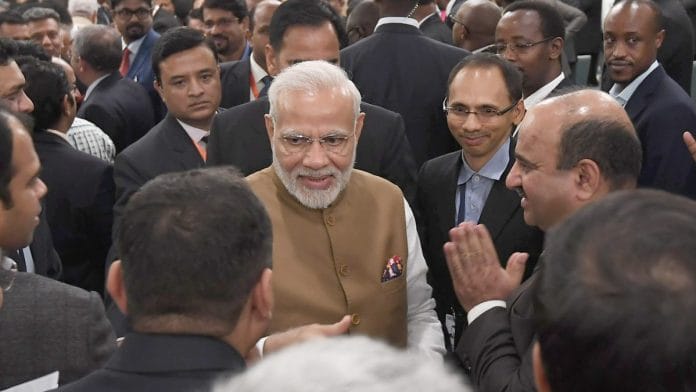New Delhi: Wealth creation and pro-business policies seem to be back on the priority list of the Narendra Modi government, with the economic slowdown forcing policymakers to encourage investments to revive economic activity.
The Economic Survey 2019-20 focusses on wealth creation, and talks about how pro-business policies are essential for India to achieve its $5 trillion economy target in the coming years.
This comes on the heels of Finance Minister Nirmala Sitharaman cutting corporate tax rates by nearly 10 percentage points in September to make India an attractive investment destination compared to other South-East Asian economies.
The government also rolled back proposed penalties for companies that violate Corporate Social Responsibility norms, which could have even landed their officials in jail.
No longer wary of being labelled ‘suit-boot ki sarkar’
These moves mark a departure from the Modi government’s stance over the last few years. The government, labelled ‘suit-boot ki sarkar’ in 2015 by Congress leader Rahul Gandhi for its attempt to make changes to the Land Acquisition Act, made a conscious effort to remove this tag and embark on policies that could be termed as ‘welfarist’ and ‘pro-poor’.
However, with economic growth expected to slow to an 11-year low of 5 per cent in 2019-20, and labour-intensive sectors like manufacturing and construction seeing a sharp deceleration, the government seems to be having a rethink about its handling of the corporates.
The Economic Survey, authored by a team led by Chief Economic Advisor Krishnamurthy Subramanian, talks about the crucial role of businesses and markets.
“The Survey posits that India’s aspiration to become a $5 trillion economy depends critically on strengthening the invisible hand of markets together with the hand of trust that can support markets,” it says, batting for promoting pro-business policies to provide equal opportunities for new entrants, enable fair competition and ease of doing business, and eliminate policies that undermine markets through government intervention, even where it is not necessary.
“India’s aspiration to become a $5-trillion-economy depends critically on promoting ‘pro-business’ policy that unleashes the power of competitive markets to generate wealth, on the one hand, and weaning away from ‘pro-crony’ policy that may favour specific private interests, especially powerful incumbents, on the other hand,” the survey says.
Praise from experts
In an interview with ThePrint earlier this month, former NITI Aayog vice-chairman Arvind Panagariya had welcomed the government’s pro-corporate stance.
“Thankfully, the effect of the ‘suit-boot ki sarkar’ label is now well behind us. If it had still been with us, the government would not have had the courage to knock down the effective corporate profit tax to just 17 per cent for new manufacturing firms and 25 per cent for others,” he had said.
N.R. Bhanumurthy, professor at the National Institute of Public Finance and Policy, says since the beginning of its first term, the Modi government has been trying to focus on corporates and improving the business environment.
“Except in probably 2018 and 2019 before the elections, where the government tilted towards distribution and welfare schemes, it has taken many steps that are pro-corporate. Be it the implementation of the goods and services tax, improving India’s rankings in the ease of doing business or the Insolvency and Bankruptcy code, all these steps have been pro-business,” says Bhanumurthy.
The Economic Survey also favours aggressive disinvestment in central public sector enterprises (CPSEs), arguing that privatisation unlocks their potential to create wealth. It also talks about the need for further improving the ease of doing business.






